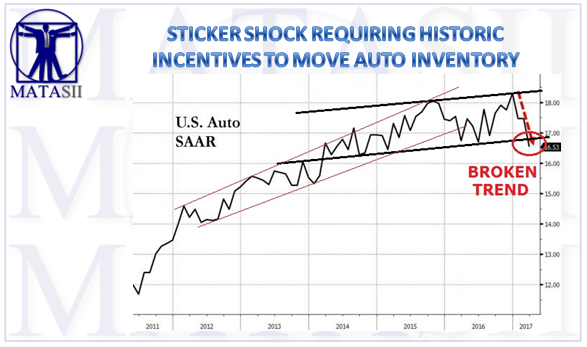STICKER SHOCK REQUIRING HISTORIC INCENTIVES TO MOVE AUTO INVENTORY
- Average auto sticker prices tend to rise 2-3% per annum,
- Industry incentive spending in March rose 13.4% year-over-year to an average of $3,511 per vehicle sold,
- While sticker prices may be rising, the price that people are actually paying is coming down, courtesy of very generous auto OEM shareholders
- SAARs Y-o-Y Units down .3M
Apparently Bloomberg and some auto executives are convinced that soaring car prices are the reason that sales are starting to slump. Bloomberg attributes the problem to new, costly technology being added vehicles:
To understand why the U.S. auto market isn’t growing, consider a top-of-the-line minivan from Fiat Chrysler Automobiles NV now costs about $50,000.With twin second-row touch screens, reclining third-row seats, a vacuum and automated parallel parking, the Chrysler Pacifica packs plenty of features to justify a hefty expense. But this big a price tag puts the prototypical family vehicle out of reach for most Americans.
Ford CFO, Bob Shanks, was quick to confirm the theory because pretty much any explanation is better than the truth, which is that auto sales have been propped up by low interest rates, a subprime debt binge that puts the 2008 mortgage crisis to shame and stretched out terms of new loans.
“At some point that will be one of the aspects that will continue to drive down the volume,” Bob Shanks, Ford’s chief financial officer, said in an interview. “It will become tougher.”“It’s not just the price of the cars -- it’s the price of everything else,” she said. “The price of things like health care, shelter -- all of that is fighting for the budget.”
And while this explanation may seem logical, it's patently false. While average auto sticker prices tend to rise 2-3% per annum, as TrueCar recently pointed out, industry incentive spending in March rose 13.4% year-over-year to an average of $3,511 per vehicle sold. So while sticker prices may be rising, the price that people are actually paying is coming down, courtesy of very generous auto OEM shareholders.

Of course, we'll get out latest look at the numbers tomorrow when OEMs report April sales. Here's how the 'experts' see things playing out:
So what say you...temporary blip or is the U.S. car buyer tapped out?





